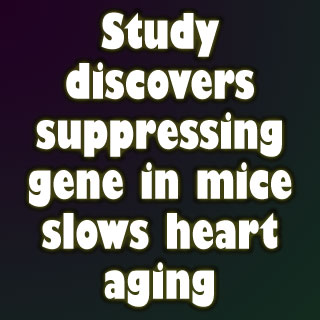
According to the American Heart Association, nearly 5.7 million Americans seem to have heart failure. In addition, approximately 10 out of every 1,000 people over age 65 are believed to be experiencing heart failure every year.
During the study, Shioi along with his colleagues examined elderly genetically engineered mice in order to suppress the activity of one form of the PI3K gene. PI3K gene is believed to be a part of the insulin/IGF-1signaling system which assists in regulating the lifespan of cells.
A variation of PI3K, known as the p110α isoform, seems to play a crucial role in tissue aging. Restraining the isoform’s activity in the roundworm C. elegans may perhaps expand its life. Furthermore, in fruit flies, suppression appears to prevent the age-dependent decrease of heart function. The study experts were noted to have compared aged mice with a functional p110α to aged mice with suppressed p110α.
“The study provides evidence that delaying or preventing heart failure in humans may be possible,†says senior author of the study, Tetsuo Shioi, M.D., Ph.D., assistant professor of medicine at Kyoto University Graduate School of Medicine in Kyoto, Japan.
Shioi further stated that, “Advanced age is a major risk factor for heart failure. One reason is that aging increases the chance of exposure to cardiovascular risk factors. However, natural changes due to aging may also compromise the cardiovascular system.â€
The findings of the study revealed that mice with the suppressed gene appear to have an improved cardiac function, less fibrosis. Fibrosis is known to cause the heart to lose flexibility. Furthermore, the findings revealed fewer biological markers of aging and a pattern of cardiac gene expression similar to that of younger mice.
“This study showed that aging of the heart can be prevented by modifying the function of insulin and paves the way to preventing age-associated susceptibility to heart failure,†adds Shioi.
“The heart failure epidemic in the United States and many other countries is due, in part, to our aging population. Aging humans experience a slow but gradual loss of heart cells and a host of other cellular and sub-cellular abnormalities which make the remaining cells contract less efficiently. Thus, this early work in a mouse model, clarifying the role of PI3K in cardiac aging, could ultimately allow scientists to understand if human hearts are similarly influenced,†says Mariell Jessup, M.D., an American Heart Association spokesperson and professor of medicine at the University of Pennsylvania School of Medicine in Philadelphia.
The study experts concluded that PI3K’s role in cardiac aging seemed to have involved regulating added points further downstream in the insulin/IGF-1signaling pathway. This IGF-1signaling pathway appears to have resulted in changes in how insulin performed in heart cells.
The biological mechanism by which suppressing the gene’s activity improved the survival of the mice seems to remain unclear. The study experts anticipate that physicians may one be able to prevent age-related heart failure in humans.
The findings of the study have been published in the journal, Circulation.
